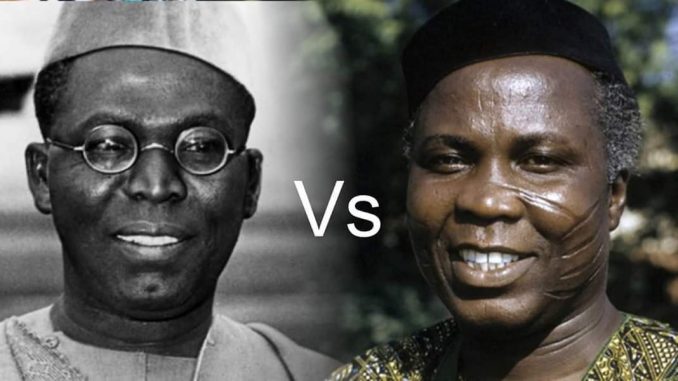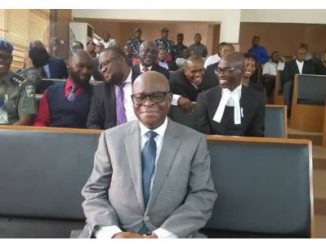
AWOLOWO Vs AKINTOLA
So many Nigerians are unaware of events that took place during the First Republic that consequently led to the first military coup the country experienced in January 15, 1966.
Before the military coup took place, Nigeria experienced numerous drama from different political bigwigs in the legislature, and the likes of Obafemi Awolowo and Samuel Akintola started a political rivalry that climaxed into something the former could not have envisaged.
It happened that the 1959 federal elections made Chief Obafemi Awolowo the leader of the opposition Action Group party (AG) in the federal parliament while his deputy, Chief Samuel Akintola, became the premier and leader of the government of Western region.
When Awolowo resigned the premiership of the Western region to contest the 1959 federal elections, Akintola was chosen to succeed him as the premier of Western region.
Since the Action Group now had control of the western region, party leaders started plans to gain power at the federal level having won 25 seats in the North and 14 seats in the East in the 1959 elections.But the party could not form the federal government through votes based on the conditions of the country as the northern region alone was two and a half times the size of the other regions (western and eastern) put together.
So the AG resolved that its only chance of gaining power at the federal level was to form a national government which comprise all the ruling parties in the different regions.
Akintola strongly supported forming a national government which would include all the ruling political parties and advocated an approach to the Northern People’s Congress (NPC). But Awolowo and other party members were opposed to it.
Awolowo and other party members suggested that the party should make advances to the southern National Convention of Nigerian Citizens (NCNC) and not to the NPC. Their hope was that the AG and the NCNC could team up together to contest the next federal elections and would break Northern Nigeria and the East into more regions.
As a result of these diverse suggestions, factions within the AG arose, one under Akintola, and the other under Awolowo
End to the conflict within the AG was not in sight. On February 1962 after the party’s annual convention at Jos, Akintola, Ayo Rosiji (party secretary) and some Western regional ministers walked out of the convention because of disagreement on several matters.
As disciplinary measures, the party would later relieve relieve Rosiji as secretary and replace the latter with Samuel Ikoku, leader of the opposition in the Eastern House of Assembly. Akintola also got his fair share of punishment as the post of the party’s deputy leader which he held was abolished. He was also found guilty on twenty-four charges to which he pleaded guilty and asked for forgiveness.
The party decided that Akintola should be removed from his positions he held as its deputy leader and as the Western regional premier. The former was done by the party and the latter was to be executed by the governor of the Western region, Oba Adesoji Aderemi.
Having accepted the first punishment, Akintola, however, rejected the second, maintaining that he had not been given the chance to test his popularity on the floor of the Western House of Assembly.
A majority of the members signed a petition withdrawing their support from Akintola and presented it to the regional governor. The governor was asked to use the powers conferred on him under Section 33 (10) of the region’s constitution to remove Akintola from office, to which the governor complied.
The relevant section of the constitution states that: “The governor shall not remove the premier from office unless it appears to him that the premier no longer commands the support of a majority of the House of Assembly.”
Akintola, however, did not accept his deposition. He challenged it in a law suit at the High Court of Western Nigeria who then transferred it to the Federal Supreme Court in Lagos to rule on the constitutionality of the dismissal.
The governor appointed Alhaji Dauda Adegbenro as the new premier. The new premier was to seek a vote of no confidence in the Western House of Assembly on May 24, 1962 when Akintola’s faction chose to disrupt the proceedings and because of the ensuing fracas had the federal government dissolve the House.
At the time the legislature was to meet, some members of Akintiola’s faction in the House went in and smashed windows and furniture and beat up members of the parliament.
After both premiers (Adegbenro and Akintola) petitioned the prime minister, Sir Abubakar Tafawa Balewa, the Assembly was reconvened again. Unfortunately, the outcome was as severe (even worse according to witnesses) as the first time.
Following the chaos, the prime minister, Sir Abubakar Tafawa Balewa, declared a state of emergency in the West on May 29, 1962 before an emergency session of the federal parliament.
Dr Moses Majekodunmi, a distinguished gynaecologist, a senator and federal minister of health, was appointed as the sole administrator of the West..
Dr. Majekodunmi instituted a commission of inquiry, headed by Judge George Baptist Ayodola Coker of the Lagos high court into corporations owned by the Western region and the commission revealed instances of poor administration and misappropriation of public funds for the benefit of the Action Group. The report came down hard on Awolowo and other AG members in his faction but exonerated Akintola.
The stage for the final act was set in the commission’s report of treasonably felony on Awolowo and his AG members.
The Nigeria police carried out search in the country during the emergency period in Western Nigeria which revealed large quantities of arms and ammunition which some AG members reportedly imported into the country to be used, allegedly, to overthrow the federal government.
Obafemi Awolowo, Anthony Enahoro, as well as some two dozen others were charged with treasonable felony and conspiracy to overthrow the federal government.
Awolowo was sentenced to 10 years while Enahoro and others were sentenced to 15 years imprisonment. These actions led to the demise of the Action Group, and on December 31, 1962, the state of emergency was terminated.
On January 1, 1963, Akintola was reinstated as premier of the western region and the head of the new government at Agodi, Ibadan, the seat of the regional government with the formation of his new party, United People’s Party (UPP), which consisted of those former Action Group members he was able to win to his side on his expulsion from AG.
It was a coalition government which was formed by the UPP and the NCNC which had previously formed the opposition. The Action Group, which had previously formed the government of the western region, now moved into the opposition.
The UPP evolved in 1964 to become the Nigerian National Democratic Party (NNDP) with Akintola as leader and as a friend of the ruling party, NPC. Therefore, the 1965 Western regional elections gave the NPC another chance of maintaining its political powers in the country, a hegemony which other political power found irksome.
More importantly, the NNDP was determined to remain in power. In the face of all overwhelming odds against the NNDP should the elections be free and fair, it was left with one alternative to rig the elections.
It was learnt that the massive rigging of the western regional elections of October 11, 1965, was shocking. The methods of electoral fraudulence employed were the familiar ones, but the scale to which they were used was overwhelmingly much more severe.
The Electoral Commission led by Eyo E. Esau publicly admitted that electoral officers were kidnapped and therefore, could not carry out their duties while some refused to accept nomination papers of certain candidates and others failed to report for duty. Many candidates who had obtained validity papers were elected “unopposed”.
There were questions of ballot papers “floating around” in the West despite the precautionary measures of giving the ballot papers to the police. The use of party agents and thugs camouflaged as members of the local government police, was common and rigging was employed in every conceivable means.
Counting was not completed in some stations before the results of these stations were broadcast over the radio. Some candidates were declared elected although their opponents scored higher votes.
As a result of the grave irregularities, the NNDP won the elections, 16 of its candidates having been returned unopposed at the close of nominations. It was publicly charged that the NNDP victory was due to fraud.
The political atmosphere in the Western region looked bleak and dismal and the after-effects of the elections were even more severe and devastating. Defeated political candidates had in the past run to the courts to challenge irregularities at elections. This time they did not go to courts. Instead, the people took law into their hands.
Riots, looting, arson and murder were the rule of the day. Party thugs poured gasoline on opponents and set them on fire, a situation then known as Operation Wet-ie. Properties, bags of cocoa and other produce of opponents awaiting shipment were also set on fire. Without a doubt, the destruction of properties was not as horrifying as setting human beings on fire.
By November 1, 1965, a riot at Ekiti resulted in the death of 15 people while a fresh riot, four days later, caused the loss of 20 lives. Sixteen people were killed in Ijebu-Ode and Ondo areas on November 7, 1965.
Houses and vehicles were set on fire and to travel within the Western region and from other regions into the West was a menace because of thugs and gangsters who took law into their own hands while the police failed to maintain law and order. There was tension and wanton destruction of human life and property.
As expected, Nigerians looked to the federal government to step in to arrest the situation in the region, but all pleas were to no avail. Meanwhile, the riots and killings continued and the NNDP government of the Western region imposed curfews in Mushin, Ikeja, Agege, Ajeromi and Awori districts. Yet, the disturbances continued and each day brought a new toll of rioting, arson, looting and murder.
Having experienced the crisis over the struggle for political power during the western region election of October 11, 1965, the military was, however, convinced that it was time to take over the mantle of leadership, and the coup plotters struck on January 15, 1966 in what would be known as the first military coup in the country.
—
Meanwhile, there was a story on how Nigeria’s First Republic prime minister, Sir Abubakar Tafawa Balewa, was killed during Nigeria’s first military coup in 1966.
The prime minister fell from the bullet of Major Emmanuel Ifeajuna the day he was captured from his home.
L’owe, l’owe la nlu ilu agidigbo.
Vide Femi Salako



Leave a Reply